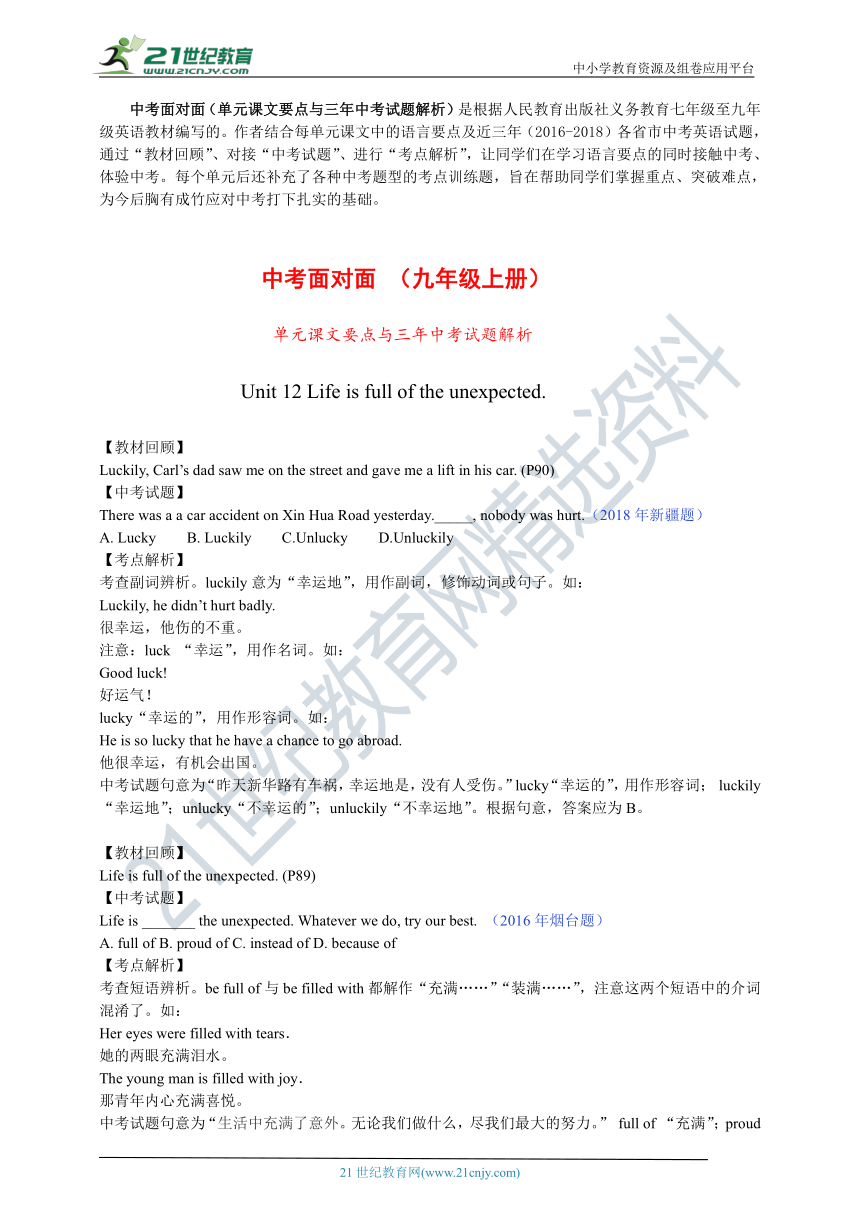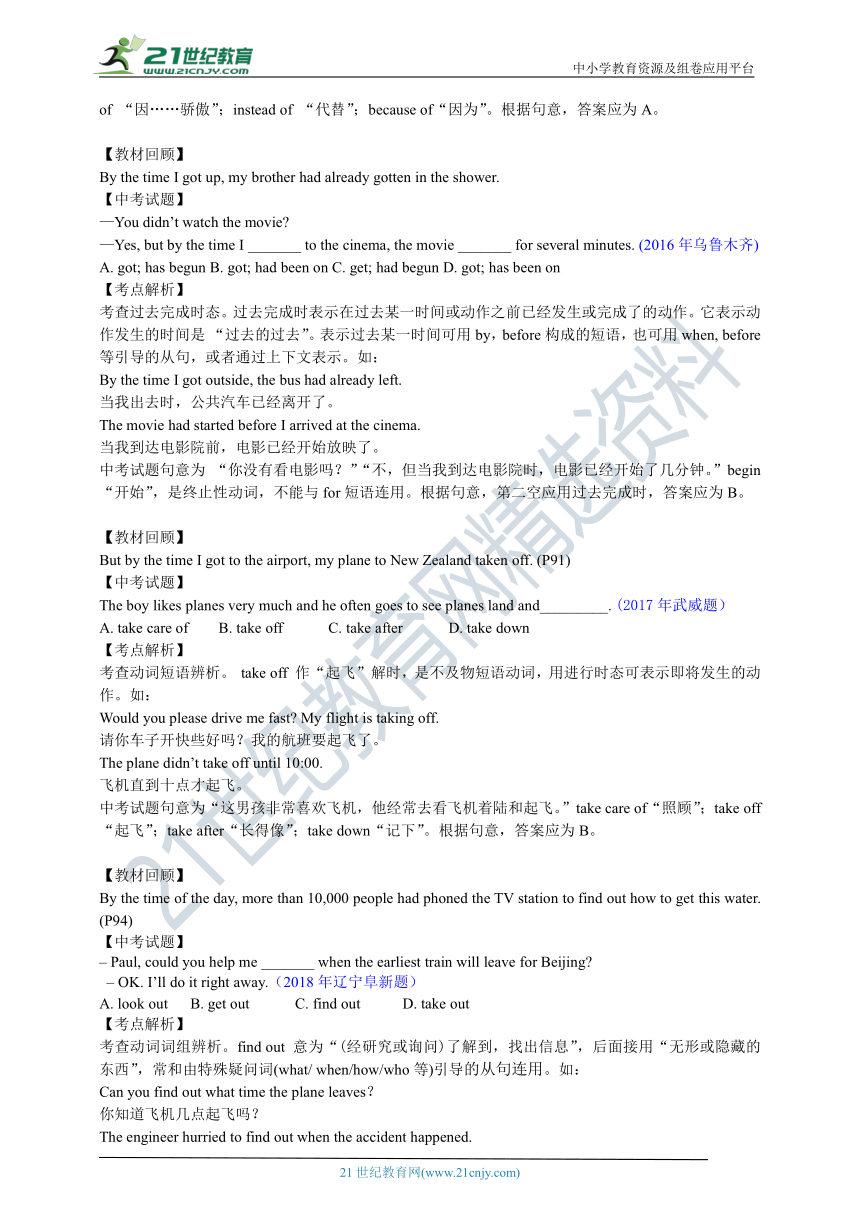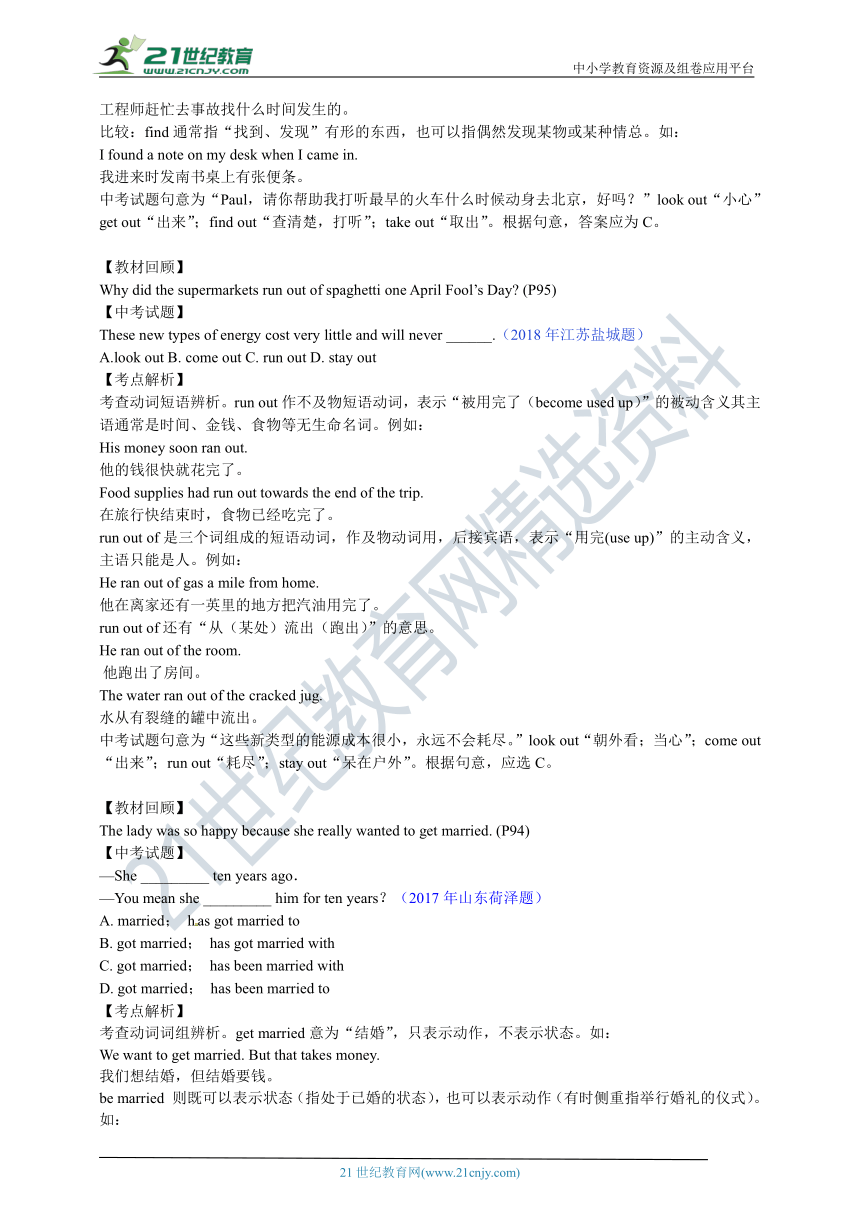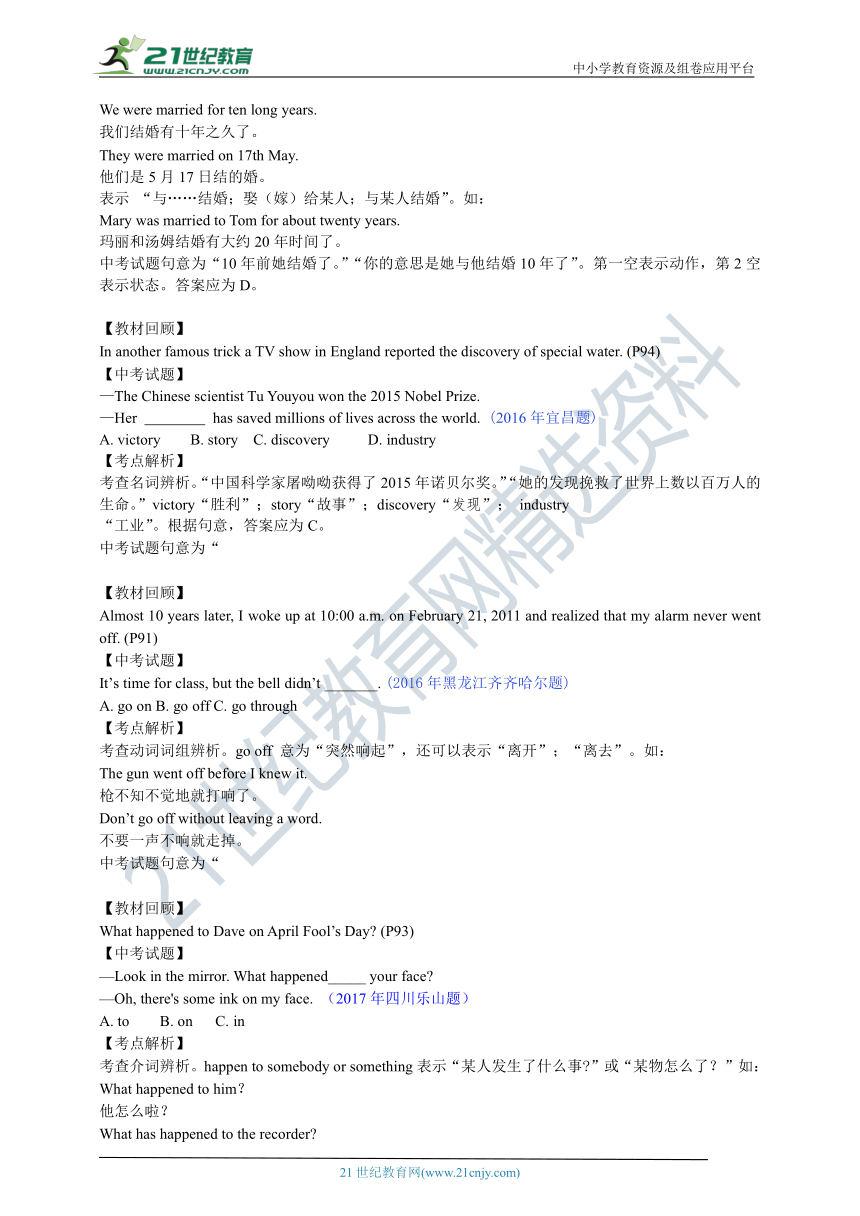中考面对面九年级Unit 12 Life is full of the unexpected(单元课文要点+三年中考试题解析+考点训练题)
文档属性
| 名称 | 中考面对面九年级Unit 12 Life is full of the unexpected(单元课文要点+三年中考试题解析+考点训练题) |  | |
| 格式 | zip | ||
| 文件大小 | 1.2MB | ||
| 资源类型 | 试卷 | ||
| 版本资源 | 人教新目标(Go for it)版 | ||
| 科目 | 英语 | ||
| 更新时间 | 2019-03-05 23:20:01 | ||
图片预览




文档简介
中小学教育资源及组卷应用平台
中考面对面(单元课文要点与三年中考试题解析)是根据人民教育出版社义务教育七年级至九年级英语教材编写的。作者结合每单元课文中的语言要点及近三年(2016-2018)各省市中考英语试题,通过“教材回顾”、对接“中考试题”、进行“考点解析”,让同学们在学习语言要点的同时接触中考、体验中考。每个单元后还补充了各种中考题型的考点训练题,旨在帮助同学们掌握重点、突破难点,为今后胸有成竹应对中考打下扎实的基础。
中考面对面 (九年级上册)
单元课文要点与三年中考试题解析
Unit 12 Life is full of the unexpected.
【教材回顾】
Luckily, Carl’s dad saw me on the street and gave me a lift in his car. (P90)
【中考试题】
There was a a car accident on Xin Hua Road yesterday._____, nobody was hurt.(2018年新疆题)
A. Lucky B. Luckily C.Unlucky D.Unluckily
【考点解析】
考查副词辨析。luckily意为“幸运地”,用作副词,修饰动词或句子。如:
Luckily, he didn’t hurt badly.
很幸运,他伤的不重。
注意:luck “幸运”,用作名词。如:
Good luck!
好运气!
lucky“幸运的”,用作形容词。如:
He is so lucky that he have a chance to go abroad.
他很幸运,有机会出国。
中考试题句意为“昨天新华路有车祸,幸运地是,没有人受伤。”lucky“幸运的”,用作形容词; luckily“幸运地”;unlucky“不幸运的”;unluckily“不幸运地”。根据句意,答案应为B。
【教材回顾】
Life is full of the unexpected. (P89)
【中考试题】
Life is _______ the unexpected. Whatever we do, try our best. (2016年烟台题)
A. full of B. proud of C. instead of D. because of
【考点解析】
考查短语辨析。be full of与?be filled with?都解作“充满……”“装满……”,注意这两个短语中的介词混淆了。如:
Her?eyes?were?filled?with?tears.
她的两眼充满泪水。
The?young?man?is?filled?with?joy.
那青年内心充满喜悦。
中考试题句意为“生活中充满了意外。无论我们做什么,尽我们最大的努力。” full of “充满”;proud of “因……骄傲”;instead of “代替”;because of“因为”。根据句意,答案应为A。
【教材回顾】
By the time I got up, my brother had already gotten in the shower.
【中考试题】
—You didn’t watch the movie?
—Yes, but by the time I _______ to the cinema, the movie _______ for several minutes. (2016年乌鲁木齐)
A. got; has begun B. got; had been on C. get; had begun D. got; has been on
【考点解析】
考查过去完成时态。过去完成时表示在过去某一时间或动作之前已经发生或完成了的动作。它表示动作发生的时间是 “过去的过去”。表示过去某一时间可用by,before构成的短语,也可用when, before等引导的从句,或者通过上下文表示。如:
By the time I got outside, the bus had already left.
当我出去时,公共汽车已经离开了。
The movie had started before I arrived at the cinema.
当我到达电影院前,电影已经开始放映了。
中考试题句意为 “你没有看电影吗?”“不,但当我到达电影院时,电影已经开始了几分钟。”begin“开始”,是终止性动词,不能与for短语连用。根据句意,第二空应用过去完成时,答案应为B。
【教材回顾】
But by the time I got to the airport, my plane to New Zealand taken off. (P91)
【中考试题】
The boy likes planes very much and he often goes to see planes land and_________. (2017年武威题)
A. take care of B. take off C. take after D. take down
【考点解析】
考查动词短语辨析。 take off 作“起飞”解时,是不及物短语动词,用进行时态可表示即将发生的动作。如:
Would you please drive me fast? My flight is taking off.
请你车子开快些好吗?我的航班要起飞了。
The plane didn’t take off until 10:00.
飞机直到十点才起飞。
中考试题句意为“这男孩非常喜欢飞机,他经常去看飞机着陆和起飞。”take care of“照顾”;take off“起飞”;take after“长得像”;take down“记下”。根据句意,答案应为B。
【教材回顾】
By the time of the day, more than 10,000 people had phoned the TV station to find out how to get this water. (P94)
【中考试题】
– Paul, could you help me _______ when the earliest train will leave for Beijing?
– OK. I’ll do it right away.(2018年辽宁阜新题)
A. look out B. get out C. find out D. take out
【考点解析】
考查动词词组辨析。find out 意为“(经研究或询问)了解到,找出信息”,后面接用“无形或隐藏的东西”,常和由特殊疑问词(what/ when/how/who等)引导的从句连用。如:
Can you find out what time the plane leaves?
你知道飞机几点起飞吗?
The engineer hurried to find out when the accident happened.
工程师赶忙去事故找什么时间发生的。
比较:find通常指“找到、发现”有形的东西,也可以指偶然发现某物或某种情总。如:
I found a note on my desk when I came in.
我进来时发南书桌上有张便条。
中考试题句意为“Paul,请你帮助我打听最早的火车什么时候动身去北京,好吗?”look out“小心”get out“出来”;find out“查清楚,打听”;take out“取出”。根据句意,答案应为C。
【教材回顾】
Why did the supermarkets run out of spaghetti one April Fool’s Day? (P95)
【中考试题】
These new types of energy cost very little and will never ______.(2018年江苏盐城题)
A.look out B. come out C. run out D. stay out
【考点解析】
考查动词短语辨析。run?out作不及物短语动词,表示“被用完了(become?used?up)”的被动含义其主语通常是时间、金钱、食物等无生命名词。例如:
His?money?soon?ran?out.?
他的钱很快就花完了。
Food?supplies?had?run?out?towards?the?end?of?the?trip.?
在旅行快结束时,食物已经吃完了。?
run?out?of?是三个词组成的短语动词,作及物动词用,后接宾语,表示“用完(use?up)”的主动含义,主语只能是人。例如:
He?ran?out?of?gas?a?mile?from?home.?
他在离家还有一英里的地方把汽油用完了。
run?out?of还有“从(某处)流出(跑出)”的意思。
He?ran?out?of?the?room.
?他跑出了房间。
The?water?ran?out?of?the?cracked?jug.?
水从有裂缝的罐中流出。
中考试题句意为“这些新类型的能源成本很小,永远不会耗尽。”look out“朝外看;当心”;come out“出来”;run out“耗尽”;stay out“呆在户外”。根据句意,应选C。
【教材回顾】
The lady was so happy because she really wanted to get married. (P94)
【中考试题】
—She?_________?ten?years?ago.
—You?mean?she?_________?him?for?ten?years?(2017年山东荷泽题)
A. married; has got married to
B. got married; has got married with
C. got married; has been married with
D. got married; has been married to
【考点解析】
考查动词词组辨析。get married意为“结婚”,只表示动作,不表示状态。如:
We want to?get married. But that takes money.
我们想结婚,但结婚要钱。
be married 则既可以表示状态(指处于已婚的状态),也可以表示动作(有时侧重指举行婚礼的仪式)。如:
We were married for ten long years.
我们结婚有十年之久了。
They were married on 17th May.
他们是5月17日结的婚。
表示 “与……结婚;娶(嫁)给某人;与某人结婚”。如:
Mary was married to Tom for about twenty years.
玛丽和汤姆结婚有大约20年时间了。
中考试题句意为“10年前她结婚了。”“你的意思是她与他结婚10年了”。第一空表示动作,第2空表示状态。答案应为D。
【教材回顾】
In another famous trick a TV show in England reported the discovery of special water. (P94)
【中考试题】
—The Chinese scientist Tu Youyou won the 2015 Nobel Prize.
—Her has saved millions of lives across the world. (2016年宜昌题)
A. victory B. story C. discovery D. industry
【考点解析】
考查名词辨析。“中国科学家屠呦呦获得了2015年诺贝尔奖。”“她的发现挽救了世界上数以百万人的生命。”victory“胜利”;story“故事”;discovery“发现”; industry
“工业”。根据句意,答案应为C。
中考试题句意为“
【教材回顾】
Almost 10 years later, I woke up at 10:00 a.m. on February 21, 2011 and realized that my alarm never went off. (P91)
【中考试题】
It’s time for class, but the bell didn’t _______. (2016年黑龙江齐齐哈尔题)
A. go on B. go off C. go through
【考点解析】
考查动词词组辨析。go off 意为“突然响起”,还可以表示“离开”;“离去”。如:
The gun went off before I knew it.
枪不知不觉地就打响了。
Don’t go off without leaving a word.
不要一声不响就走掉。
中考试题句意为“
【教材回顾】
What happened to Dave on April Fool’s Day? (P93)
【中考试题】
—Look in the mirror. What happened_____ your face?
—Oh, there's some ink on my face. (2017年四川乐山题)
A. to B. on C. in
【考点解析】
考查介词辨析。happen to somebody or something表示“某人发生了什么事?”或“某物怎么了?”如:
What happened to him?
他怎么啦?
What has happened to the recorder?
录音机怎么啦?
中考试题句意为“照照镜子,你的脸怎么了?哦,我脸上有墨水。”根据happened to句型,答案应为A。
【教材回顾】
So I just quickly put on some clothes and rushed out the door. (P90)
【中考试题】
It’s windy outside. _______ your jacket, Bob. Don’t catch a cold. (2016年成都题)
A. try on B. put on C. take off
【考点解析】
考查动词短语辨析。put on意为“穿上”;“戴上”,强调动作。如:
She put on a red coat and went out.
她穿上红色的大衣出去了。
注意:put on是一时的动作,不可以跟表示一段时间的状语连用。如可以说:He wore a straw
hat all day. 他整天戴着帽子。不可以说:He put on a straw hat all day.
wear表示“穿着”;“戴着”,强调状态,用一般现在时表示经常性动作,用现在进行时表示暂时状态。如:
We wear our rain boots on a rainy day.
我们在下雨天穿雨鞋。
Is she wearing the same clothes?
她穿着同样的衣服吗?
中考试题句意为“外面风大,穿上杰克。不要感冒了。”try on“试穿”; put on“穿上”; take off“脱下”。根据句意,答案应为B。
【教材回顾】
They said this water would help people lose weight and that one customer had already lost a lot of weight in just four months. (P94)
【中考试题】
Daniel has tried to lose ___________ by eating less recently, but two kilos has been put on instead
(2017年广东广州题)
A. weight B. weights C. height D. heights
【考点解析】
考查名词辨析。weight意为“重;重量”,用作名词。lose weight“减轻体重”; put on weight“发胖”。如:
What’s your weight?
你体重多少?
You won’t put on weight easily if you eat more fruit and vegetables.
如果你多吃水果和蔬菜,你将不会发胖。
中考试题句意为“Daniel?最近在通过少吃来尽量减轻体重,但是他又胖了两公斤。”weight “体重”,height“高度”,根据句意,答案为A.
考点训练题
根据首字母及句意完成句子。
1.L________ for me, he spoke very good English.
2.Scientists have made an important d________.
3.My w________ is 130 pounds.
4.The bus is f________ of many people.
5.He has been m________to Mary for ten years.
二、用所给动词的适当形式填空。
take off find out run out go off put on
1.When I got to the airport, the plane had ________.
2.Why is your mobile phone always ________?
3.It’s so cold outside, please ________your coat.
4.—Jack, could you help me ________when the plane will take off on the Internet?
—I’m sorry, but my computer doesn’t work.
5.His money?had?________?towards?the?end?of?the?trip.?
三、完成句子
1.Please tell me _________________(你的腿怎么啦)?
2.By the time I got back to school, _____________(铃已经响了)
3.How long have you ____________________(与玛丽结婚)?
4.The basket on the table ___________________(装满苹果).
5.Will you try to _______________(打听火车什么时候离开)?
四、选择填空
1.Our geography teacher told us to ________ more information about our city and share it next week.
A. find out B. keep away C. turn off D. use up
2.As?we?returned?to?the?home,?everything?I?touched?seemed?to?________ life.
A. be?full?with B. be?full?of? C. be filled of D. fill with
3.—When did you________?
—I've________for two months.
A. get married; been married B. get married; married
C. get married; gotten married D. marry; married
4.My daughter got up and dressed herself quickly when her alarm clock________.
A. ran off B. went off C. set off D. turned off
5.—Did you see Mr. Wang yesterday morning?
—No. By the time I________ to school,he ________.
A. got; left B. had got; had left C. got; had left D. had got; left
Key:
一、
1.Luckily
2. discovery.
3. weight
4.full
5. married
二、
1. taken off.
2. going off
3. put on
4. find out
5. run?out?
三、
1.what happened to your leg
2.the bell had rung
3.been married to Mary?
4.is full of apples.
5. find out when the train leaves
四、ABABC
21世纪教育网 www.21cnjy.com 精品试卷·第 2 页 (共 2 页)
HYPERLINK "http://21世纪教育网(www.21cnjy.com)
" 21世纪教育网(www.21cnjy.com)
同课章节目录
- Unit 1 How can we become good learners.
- Section A
- Section B
- Unit 2 I think that mooncakes are delicious!
- Section A
- Section B
- Unit 3 Could you please tell me where the restroom
- Section A
- Section B
- Unit 4 I used to be afraid of the dark.
- Section A
- Section B
- Unit 5 What are the shirts made of?
- Section A
- Section B
- Review of Units 1-5
- Unit 6 When was it invented?
- Section A
- Section B
- Unit 7 Teenagers should be allowed to choose their
- Section A
- Section B
- Unit 8 It must belong to Carla.
- Section A
- Section B
- Unit 9 I like music that I can dance to.
- Section A
- Section B
- Unit 10 You're supposed to shake hands.
- Section A
- Section B
- Review of Units 6-10
- Unit 11 Sad movies make me cry.
- Section A
- Section B
- Unit 12 Life is full of the unexpected
- Section A
- Section B
- Unit 13 We're trying to save the earth!
- Section A
- Section B
- Unit 14 I remember meeting all of you in Grade 7.
- Section A
- Section B
- Review of Units 11-14
